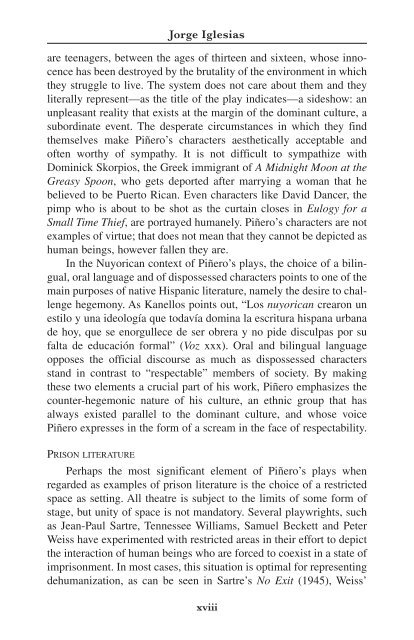You also want an ePaper? Increase the reach of your titles
YUMPU automatically turns print PDFs into web optimized ePapers that Google loves.
are teenagers, between <strong>the</strong> ages <strong>of</strong> thirteen and sixteen, whose innocence<br />
has been destroyed by <strong>the</strong> brutality <strong>of</strong> <strong>the</strong> environment in which<br />
<strong>the</strong>y struggle to live. The system does not care about <strong>the</strong>m and <strong>the</strong>y<br />
literally represent—as <strong>the</strong> title <strong>of</strong> <strong>the</strong> play indicates—a sideshow: an<br />
unpleasant reality that exists at <strong>the</strong> margin <strong>of</strong> <strong>the</strong> dominant culture, a<br />
subordinate event. The desperate circumstances in which <strong>the</strong>y find<br />
<strong>the</strong>mselves make Piñero’s characters aes<strong>the</strong>tically acceptable and<br />
<strong>of</strong>ten worthy <strong>of</strong> sympathy. It is not difficult to sympathize with<br />
Dominick Skorpios, <strong>the</strong> Greek immigrant <strong>of</strong> A Midnight Moon at <strong>the</strong><br />
Greasy Spoon, who gets deported after marrying a woman that he<br />
believed to be Puerto Rican. Even characters like David Dancer, <strong>the</strong><br />
pimp who is about to be shot as <strong>the</strong> curtain closes in Eulogy for a<br />
Small Time Thief, are portrayed humanely. Piñero’s characters are not<br />
examples <strong>of</strong> virtue; that does not mean that <strong>the</strong>y cannot be depicted as<br />
human beings, however fallen <strong>the</strong>y are.<br />
In <strong>the</strong> Nuyorican context <strong>of</strong> Piñero’s plays, <strong>the</strong> choice <strong>of</strong> a bilingual,<br />
oral language and <strong>of</strong> dispossessed characters points to one <strong>of</strong> <strong>the</strong><br />
main purposes <strong>of</strong> native Hispanic literature, namely <strong>the</strong> desire to challenge<br />
hegemony. As Kanellos points out, “Los nuyorican crearon un<br />
estilo y una ideología que todavía domina la escritura hispana urbana<br />
de hoy, que se enorgullece de ser obrera y no pide disculpas por su<br />
falta de educación formal” (Voz xxx). Oral and bilingual language<br />
opposes <strong>the</strong> <strong>of</strong>ficial discourse as much as dispossessed characters<br />
stand in contrast to “respectable” members <strong>of</strong> society. By making<br />
<strong>the</strong>se two elements a crucial part <strong>of</strong> his <strong>work</strong>, Piñero emphasizes <strong>the</strong><br />
counter-hegemonic nature <strong>of</strong> his culture, an ethnic group that has<br />
always existed parallel to <strong>the</strong> dominant culture, and whose voice<br />
Piñero expresses in <strong>the</strong> form <strong>of</strong> a scream in <strong>the</strong> face <strong>of</strong> respectability.<br />
PRISON LITERATURE<br />
Jorge Iglesias<br />
Perhaps <strong>the</strong> most significant element <strong>of</strong> Piñero’s plays when<br />
regarded as examples <strong>of</strong> prison literature is <strong>the</strong> choice <strong>of</strong> a restricted<br />
space as setting. All <strong>the</strong>atre is subject to <strong>the</strong> limits <strong>of</strong> some form <strong>of</strong><br />
stage, but unity <strong>of</strong> space is not mandatory. Several playwrights, such<br />
as Jean-Paul Sartre, Tennessee Williams, Samuel Beckett and Peter<br />
Weiss have experimented with restricted areas in <strong>the</strong>ir effort to depict<br />
<strong>the</strong> interaction <strong>of</strong> human beings who are forced to coexist in a state <strong>of</strong><br />
imprisonment. In most cases, this situation is optimal for representing<br />
dehumanization, as can be seen in Sartre’s No Exit (1945), Weiss’<br />
xviii


